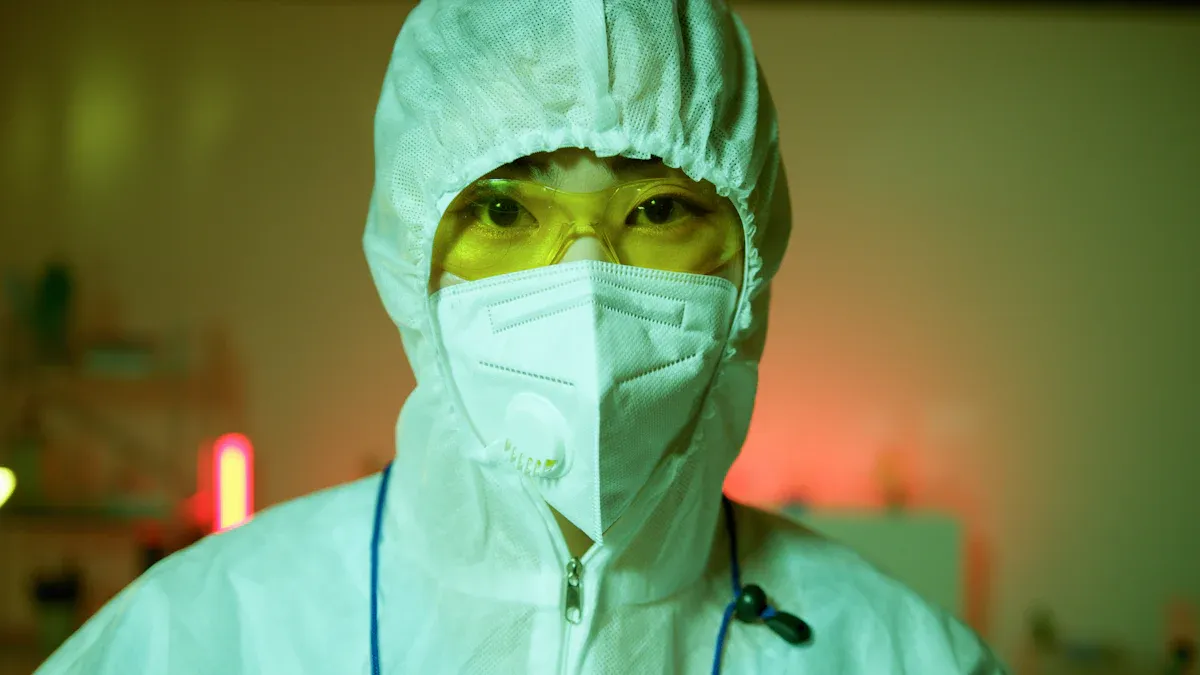Guide to Compliance and Safety for PET Heat Shrink Tubing in Medical Devices

PET heat shrink tubing is very important in medical uses. Patient safety and device reliability are always the main goals. Doctors and nurses need tubing that follows strict rules. These products go through tough UL safety tests. They also last over 10 years outside in all weather. This makes them strong for a long time. In 2024, the PET heat shrink tubing market was worth USD 350 million. This happened because of rules and the need for Sterilizable PET Heat Shrink for Surgical Tools. Medical-grade tubing keeps patients safe. It gives insulation and lowers risks in medical device parts.
Statistic / Fact | Value / Description |
|---|---|
Market revenue (2024) | USD 350 million |
PET heat shrink tubing market share (2023) | About 60% |
Safety and durability tests | Passed UL standards and 10+ years outdoor weather resistance tests |
Key Takeaways
PET heat shrink tubing is very important for medical devices. It follows strict safety and quality rules. This helps keep patients and device parts safe.
Standards like ISO 10993, USP Class VI, FDA Title 21, and ISO 13485 are followed. These rules make sure the tubing is safe, works with the body, and can be trusted.
The tubing does not wear out easily. It protects against electrical dangers and germs. It can be cleaned many times in hospitals.
Makers must pick the right materials. They need to test the tubing well. They also must keep good records to show they follow the rules. This helps people trust them.
New ideas and good quality checks make PET heat shrink tubing better. It can become stronger, thinner, and better for the environment in the future.
Compliance Overview
Key Standards
The medical field uses strict rules for safety. These rules make sure pet heat shrink tubing works well. They help companies follow laws and keep patients safe. The most important rules are:
ISO 10993: This rule checks if the tubing is safe for the body. It makes sure pet heat shrink tubing does not hurt people.
USP Class VI: This rule tests if the tubing is toxic or safe. Medical products must pass these tests to meet tough rules.
ISO 13485: This rule helps companies make safe products every time. It guides them to follow the right steps.
FDA 21 CFR Part 820: This rule tells companies how to make safe medical devices in the United States.
Note: Following these rules helps companies get the right approvals. It also makes sure pet heat shrink tubing is safe to use in hospitals.
Regulatory Bodies
Many groups watch over pet heat shrink tubing in medical devices. These groups make and check the rules to keep patients safe. Important groups are:
Regulatory Body | Region | Role in Medical Regulations |
|---|---|---|
FDA | United States | Checks if medical devices follow the rules |
EMA | Europe | Watches over medical device rules |
ISO | Global | Makes rules for many countries |
USP | United States | Sets rules for safety and quality |
These groups make sure companies follow all the rules. They check products to see if they are safe and legal. The medical field trusts these groups to keep high safety and quality. Pet heat shrink tubing must pass all checks before it is used in any medical device.
PET Heat Shrink Tubing in Medical Devices

Applications
PET heat shrink tubing is used in many medical tools. Manufacturers use it when they need to join parts together. It is helpful for overlap joints and making catheters. This tubing helps make strong connections in devices. It makes building medical tools faster and better. In catheters, PET heat shrink tubing covers and protects the parts. It also helps hold pieces together during assembly.
Some medical jobs need special tubing designs. Peelable heat shrink tubing is easy to take off after heating. This makes work safer and helps workers do a better job. In GI and endoscopy, colored tubing helps doctors see wire guides. During biopsies, PET heat shrink tubing covers forceps that get hot. This keeps the tool and the patient safe. These uses show PET heat shrink tubing helps keep devices safe and working well.
Benefits
Medical grade heat shrink tubes have many good points for medical use. The tubing’s exact size helps it fit tightly. This stops slipping or parts moving out of place. Bigger sizes, up to 25% more, make it easy to use. Shrink ratios like 2:1 or 3:1 help the tubing fit many shapes. This makes devices last longer.
Property | Benefit for Medical Devices |
|---|---|
Flame-retardant | Lowers fire risk in surgical environments |
Mechanical strength | Shields instruments from abrasion and impact |
Electrical insulation | Protects sensitive electronics, ensuring patient safety |
Biocompatibility | Safe for contact with human tissue |
Sterilization resistance | Maintains performance after repeated sterilization |
Regulatory compliance | Meets strict medical standards for safety and effectiveness |
PET heat shrink tubing is safe for use with people. It can be cleaned many times and still work well. Its strength helps devices last longer. It also stops electrical problems in important tools. By following rules, PET heat shrink tubing helps keep patients safe and devices working right.
Medical Grade Heat Shrink Tubes: Safety Standards
Medical grade heat shrink tubes must follow strict safety rules before use. These rules focus on biocompatibility, non-toxicity, and cytotoxicity limits. They help make sure pet heat shrink tubing is safe when it touches people. Manufacturers must follow these rules to keep patients safe and meet the law.
ISO 10993 Biocompatibility
ISO 10993 gives the main rules for biocompatibility tests. This standard checks if the tubing is safe to touch the body. It looks for irritation, toxicity, and allergic reactions. Device makers use ISO 10993 to show pet heat shrink tubing will not hurt patients.
Manufacturers say their medical grade heat shrink tubes meet ISO 10993 rules. They also say their products pass USP Class VI rules. But they do not always share all test results or numbers. The main goal is to follow the rules and get the right certificates.
Note: Biocompatibility testing under ISO 10993 helps lower the chance of bad reactions. It makes sure medical grade heat shrink tubes can safely touch blood, tissue, or fluids.
USP Class VI Certification
USP Class VI certification is another important safety step. This certification checks if the tubing is non-toxic and safe for medical use. The tests look for harmful chemicals that could come out during use. They also check for cytotoxicity, which means the tubing should not hurt living cells.
Medical grade heat shrink tubes that pass USP Class VI are very safe. These tubes can be used in devices that touch the body or fluids. Hospitals and clinics trust these products because the certification proves the tubing meets tough safety rules.
FDA Requirements
The FDA has strict rules for medical grade heat shrink tubes under FDA Title 21. These rules cover how companies design, make, and test their products. The FDA checks if the tubing meets all safety and performance rules before use.
Manufacturers must follow FDA Title 21 from start to finish. The FDA looks at all certificates and test results. Companies must keep good records to show their pet heat shrink tubing meets FDA Title 21. The FDA also checks for biocompatibility and other safety rules.
Tip: Following FDA Title 21 helps companies avoid recalls and legal trouble. It also builds trust with doctors and patients who need safe medical devices.
ISO 13485 Quality Systems
ISO 13485 sets the quality system for companies that make medical grade heat shrink tubes. This standard helps companies keep high safety and quality at every step. It covers process control, paperwork, and regular checks to make sure products meet all safety rules.
The table below shows how ISO 13485 helps pet heat shrink tubing:
Quality Indicator / Aspect | Description / Improvement | Quantitative Measure / Timeframe |
|---|---|---|
Process Capability Index (Cpk) | Checks process ability under ISO 13485 | Cpk > 1.33, showing strong performance |
Measurement System Evaluation | Regular checks for accuracy and reliability | Ongoing, as part of the quality system |
Pass Rate and Production Efficiency | Gets better with process changes and automation | Not given as a percentage |
Cost Control | Cuts costs with automation and better processes | Makes products more cost-effective |
Delivery Times | Sample lead times: 3 days (standard), 2 weeks (custom) | Formal order delivery: 1 month |
ISO 13485 helps companies keep their medical grade heat shrink tubes safe and reliable. It also helps with faster delivery and better cost control. Companies that follow ISO 13485 can show proof of certification and meet global safety rules.
Block Quote: Quality management under ISO 13485 makes sure every batch of medical grade heat shrink tubes is safe and works well.
Sterilizable PET Heat Shrink for Surgical Tools

Sterilization Methods
Sterilizable PET heat shrink for surgical tools can handle many cleaning steps. Hospitals use different ways to make sure devices are safe for patients. PET heat shrink tubing is special because it stays strong and keeps its shape after cleaning.
Gamma ray sterilization works with PET tubing. The tubing does not get weak or lose its shape after this.
Ethylene oxide sterilization is also used a lot. PET heat shrink tubing stays tough and safe after this step.
High-temperature sterilization is needed for many surgical tools. PET tubing can take the heat again and again without breaking.
These ways help hospitals stop infections and keep things clean. PET heat shrink tubing follows strict medical rules like ISO 10993 and USP Class VI. This means the tubing is safe to use in surgery and can touch the body or fluids without danger.
Tip: Always make sure sterilizable PET heat shrink for surgical tools matches the cleaning method your hospital uses.
Performance in Surgical Environments
Sterilizable PET heat shrink for surgical tools must work well in hard places. In the operating room, tools face heat, water, and lots of cleaning. PET heat shrink tubing protects tools from damage. It keeps its size and shape, even after many cleanings.
A big plus of PET tubing is its strong wear resistance. It does not crack or peel, even with strong cleaners. This makes it a good pick for surgery. The tubing also helps stop germs by sealing and covering tool parts.
The table below shows how sterilizable PET heat shrink for surgical tools works in surgery:
Feature | Benefit in Surgical Use |
|---|---|
High wear resistance | Lasts through repeated sterilization |
Maintains structure | Keeps tools safe and effective |
Seals device surfaces | Reduces contamination risk |
Sterilizable PET heat shrink for surgical tools helps make safe, long-lasting tools. It helps hospitals keep patients safe and follow strict cleaning rules.
Safety and Performance
Abrasion Protection
Medical devices get handled a lot and can be treated roughly. Pet heat shrink tubing helps protect these devices from getting scratched. The tubing makes a strong cover over important parts. This cover helps stop damage and keeps tools safe. Hospitals use this to help their tools last longer.
Note: Abrasion resistance helps keep medical devices safe by lowering the chance of breaking during use.
A table below shows how abrasion protection helps medical tools:
Feature | Benefit for Medical Devices |
|---|---|
Tough outer layer | Stops scratches on the surface |
Long-lasting material | Lowers how often you need new ones |
Consistent protection | Keeps devices safe every time |
Electrical Insulation
Many medical devices need electricity to work right. Pet heat shrink tubing is great at stopping electricity from going where it should not. It covers wires and parts to block unwanted current. This keeps patients and workers safe from electric shock.
Pet heat shrink tubing also keeps water and dust away from electronics. Hospitals trust this tubing to help devices work safely. Electrical insulation is very important in all medical places.
Stops short circuits
Guards against electric shock
Helps devices work well
Contamination Prevention
Clean tools are very important in hospitals. Pet heat shrink tubing helps stop germs by sealing the outside of devices. The tubing makes a smooth cover that blocks germs, liquids, and dust.
It is easy to clean and sterilize devices with this tubing. The tubing does not break down after many cleanings. This helps stop infections and keeps patients safe.
Tip: Always pick tubing that follows medical safety rules for stopping germs and for cleaning.
Achieving Compliance
People who make medical devices must follow clear steps to meet the rules. This helps make sure PET heat shrink tubing is safe and follows all laws. Companies need to do things in order, from picking materials to keeping good records.
Material Selection
Choosing the right material is the first step to follow the rules. Companies must pick PET heat shrink tubing that passes tough tests. Each material needs to be checked for safety, strength, and what it is made of. The table below shows important rules and what companies must do for PET heat shrink tubing:
Standard/Specification | Scope/Application | Stepwise Compliance & Quantitative Criteria |
|---|---|---|
UL/CSA 224 | Electrical insulation tubing including heat shrinkable types | Needs samples tested for strength, stretching, electric safety, burning, heat, cold, and more. Each test has rules for passing. |
AMS-DTL-23053 | Electrical heat shrinkable tubing | Needs tests for weight, strength, stretching, electric safety, burning, heat, and liquid safety. Sizes and checks are listed. |
MIL-I-631 | Flexible electrical insulating materials including PET tubing | Has classes and grades. Tests for bending, burning, oil, rust, fungus, chemicals, and storage. |
EU REACH Regulation | Chemical safety and substance restrictions | Needs reports if bad chemicals are over 0.1%. Makes sure materials are safe. |
RoHS Directives | Restriction of hazardous substances in electrical equipment | Limits lead, mercury, cadmium, and other bad things. Needs tests and proof. |
FMVSS 302 | Flammability of interior materials in vehicles | Checks how fast tubing burns. It must not burn too fast in cars. |
NSF-61 | Health effects for drinking water contact materials | Needs all chemicals listed. Factories are checked. Samples are tested to make sure nothing harmful gets into water. |
3-A Sanitary Standards | Sanitary design and cleanability for dairy industry tubing | Needs lab tests to show tubing is clean and safe for food. |
Companies must check every material with these rules. They need to write down all test results and keep them for checks later. This step helps make sure they follow the rules.
Tip: Always check that your PET heat shrink tubing supplier gives you all the needed papers and certificates.
Testing and Validation
Testing and checking make sure PET heat shrink tubing is safe and works well. Companies must make plans for testing each product. These plans have tests for strength, stretching, electric safety, and chemical safety. Every test must follow the rules from the groups in charge.
If a company has ISO 13485, it shows they have good quality control. In 2021, more than 27,000 companies had this certificate. This helps lower complaints by almost all and makes products safer. Good ways to do this are to keep written test plans, control the process, and keep careful records. These steps help find problems and make products better.
Best Practice Aspect | Description |
|---|---|
Documented Testing Plans | Write down all changes and tests, using math tools if needed |
Process Control | Use math and stats to keep making good products |
Record-Keeping | Keep careful records to show you follow the rules |
Companies must check every batch of PET heat shrink tubing. They must save all test results and certificates. This helps customers and rule-makers trust the company.
Note: Testing and checking often helps companies stop problems and keep up with new rules.
Documentation
Good records help every step of following the rules. Companies must keep careful notes about picking materials, testing, and checking. These notes must have certificates, test papers, and check results. Good records help companies get ready for checks and visits.
Here are the steps for keeping good records:
Get all certificates and test papers from your suppliers.
Write down every test and check in one place.
Update your notes after every change or new step.
Make files ready for checks, with all needed papers and proof.
Check and update your records often to match new rules.
Block Quote: "Good records are the key to following the rules. They show every product is safe and meets all standards."
Companies that do these steps can prove they follow the rules. They can also answer fast if someone checks their work. This helps make safe medical devices and builds trust in the market.
Continuous Improvement
Innovation in PET Heat Shrink Tubing
Manufacturers are always working to make pet heat shrink tubing better. They try to make it thinner, stronger, and more bendable. Some tubing is now less than 0.1mm thick. This helps make medical devices smaller. The thin tubing can seal tightly without making devices bulky. Medical engineers use these new types to build safer tools for surgery and tests.
There are new kinds of tubing, like halogen-free flame-retardant ones for planes. Some tubing can handle sunlight for outdoor medical gear. These new ideas help protect electronics and make devices last longer. The clear tubing lets people see inside to check parts. This helps with quality checks. Some tubing now has smart features like RFID tags and blockchain tracking. These help follow devices from start to finish.
People care more about the environment now. Companies use recycled and compostable PET for tubing. Some systems use less energy, saving over 20%. Experts think the market for very thin PET heat shrink tubing will grow 6-8% each year for ten years.
Tip: Picking new tubing can make devices safer, help follow rules, and be better for the planet.
Ongoing Quality Management
Quality is very important for companies making pet heat shrink tubing. They use machines to make things faster and cheaper. They test every batch to make sure it is safe and works well. Companies keep good records to show they follow world rules.
A good quality system has these steps: routine checks of how things are made, training workers all the time, using math tools to watch the process, and fixing problems fast when customers say something is wrong.
Quality Practice | Benefit |
|---|---|
Automated inspection | Fewer mistakes |
Regular audits | Better rule-following |
Staff training | More even products |
Customer feedback loop | Quicker fixes |
Companies that keep working on quality earn trust from hospitals and device makers. They make sure pet heat shrink tubing stays safe, works well, and is ready for new needs.
PET heat shrink tubing is very important in medical tools because it meets tough safety and quality rules. Makers follow FDA, ISO 10993, and ISO 13485 to keep every device safe and working well.
The tubing stops germs, can be cleaned in many ways, and stays strong after many uses.
Suppliers have FDA and CE certificates, which help people trust them and show they follow the rules.
Checking quality all the time and following new rules helps keep medical products safe for people.
Makers should always learn about new rules and keep making their work better to meet changing safety needs in medicine.
FAQ
What makes PET heat shrink tubing suitable for medical devices?
PET heat shrink tubing is strong and flexible. It is safe to use with people. Companies pick it because it follows tough safety rules. The tubing does not get damaged by chemicals or cleaning. Hospitals use it because it works well in important medical tools.
How do manufacturers prove compliance with medical standards?
Manufacturers write down every test and certificate. They show proof for ISO 10993, USP Class VI, and FDA rules. Inspectors can look at these papers when they visit.
Tip: Always ask your supplier for proof that the tubing meets the rules.
Can PET heat shrink tubing withstand repeated sterilization?
Yes. PET heat shrink tubing keeps its shape and strength after many cleanings. It works with gamma, ethylene oxide, and high heat. This means it is safe to use again and again in surgery.
What are the main risks if tubing does not meet standards?
If tubing does not follow the rules, it can break or let germs in. This can hurt patients or make devices stop working. Hospitals might have to recall products or face legal trouble. Using certified tubing helps keep everyone safe.

